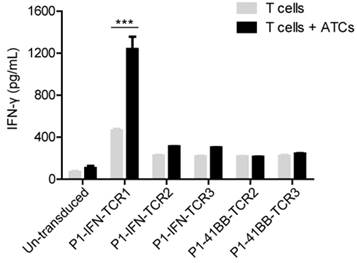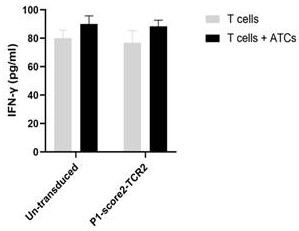A method for screening tumor-specific TCRs
A TCR-T, specific technology, applied in the field of tumor immunity, can solve the problems of false negatives, large differences in expression levels, missing tumor-specific T cells, etc.
- Summary
- Abstract
- Description
- Claims
- Application Information
AI Technical Summary
Problems solved by technology
Method used
Image
Examples
Embodiment 1
[0031] Example 1 TILs single cell transcriptome and TCR group sequencing
[0032] TILs culture
[0033] After the tumor tissue of the tumor patient is surgically removed, the tumor tissue is chopped into small pieces of 1-2 mm, and each small piece of tumor tissue is placed in a well of a 24-well cell culture plate, and then T cell culture medium is added. T cell medium contains X-VIVO 15 serum-free medium (Lonza, USA) and IL2 (50U / ml; Peprotech, USA), IL-7 (10 ng / mL; Peprotech, USA), IL-15 (10 ng / mL, Peprotech, USA), OKT3 antibody (50ng / ml; ACRO, USA) and anti-CD28 antibody (1ug / ml; T&L Biotechnology, China). The small pieces of tumor tissue were cultured in a cell culture incubator until final TILs were obtained.
[0034] Co-incubation with corresponding tumor cells
[0035] TILs and corresponding autologous tumor cells were co-incubated in X-VIVO15 serum-free medium for 12 hours, then washed with PBS, according to 10Xgenomic requirements, cell size: ≤30 μm; cell viabili...
Embodiment 2
[0056] Example 2 Construction of TCR-T lentiviral vector
[0057] (1) In Example 1, a total of 21 TCRs were found, but since the partial TCRs of TCR1-3 obtained by different test groups were the same, the applicant synthesized the above-mentioned 9 non-repetitive TCRs respectively, and in each TCR core Add XbaI and SalI restriction sites to both ends of the nucleotide sequence, and clone into the pUC57 vector;
[0058] (2) Digest the pUC57 vector containing the target gene with XbaI and SalI, cut the gel and recover the target gene fragment;
[0059] (3) The original vector pCDH-EF1-Luc2-T2A-tdTomato was digested with XbaI and SalI, and the vector fragment of about 6.5kb was recovered by gel cutting;
[0060] (4) Ligate the recovered target gene and vector fragment with DNA ligase to obtain a recombinant lentiviral vector carrying each TCR.
Embodiment 3
[0061] Example 3 Preparation of TCR lentivirus
[0062] The nine kinds of recombinant lentiviral vectors in Example 2 were transfected into 293ft cells by transfection reagent (PEI) to produce lentiviruses. The specific method includes: adding the packaging plasmid mixture (pMDL:VSV-G:REV=5:3:2, mass ratio) and TCR1 lentiviral vector to 500 μL serum-free medium Opti-MEM at a mass ratio of 1:1, vortex Swirl to mix well. Add 32g of PEI to 500 μL of serum-free medium Opti-MEM, vortex until fully mixed. Then mix 500ul of the plasmid mixture with 500ul of PEI, and add it to 293ft cells with a confluence of about 90%. After 48 hours, the virus supernatant is collected, and after ultracentrifugation, the virus is concentrated 100 times to obtain the concentrated virus.
PUM
 Login to View More
Login to View More Abstract
Description
Claims
Application Information
 Login to View More
Login to View More - R&D Engineer
- R&D Manager
- IP Professional
- Industry Leading Data Capabilities
- Powerful AI technology
- Patent DNA Extraction
Browse by: Latest US Patents, China's latest patents, Technical Efficacy Thesaurus, Application Domain, Technology Topic, Popular Technical Reports.
© 2024 PatSnap. All rights reserved.Legal|Privacy policy|Modern Slavery Act Transparency Statement|Sitemap|About US| Contact US: help@patsnap.com










